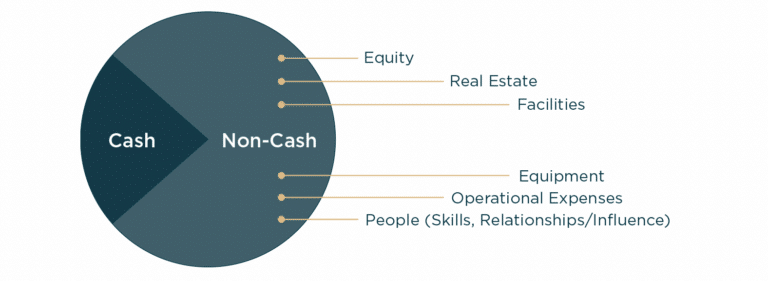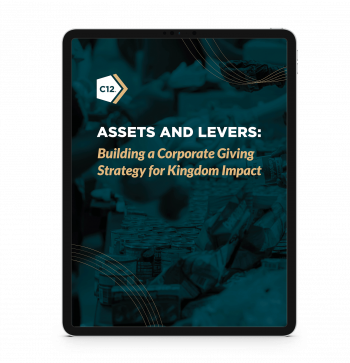Three Steps to Maximize Corporate Giving
Leverage Business Assets and Relationships for Strategic Generosity
Corporate giving offers Christian business leaders like you a unique opportunity to make a lasting Kingdom impact on the causes you care about. With the resources and influence your company has built, it can become a powerful force for good. However, in the fast pace of business, corporate giving is often an afterthought—added to the budget without a clear strategy. Many leaders find their giving has become routine, disconnected from a deeper purpose, and directed to causes that lack personal connection.
Have you and your leadership team taken the time to develop a guiding philosophy for corporate generosity? Have you identified causes that not only inspire your team but also align with your company’s mission, vision, and values? Imagine multiplying your impact by uniting employees, customers, and partners in a shared vision for meaningful, lasting Kingdom impact.
Corporate giving is not just about writing checks or donating a percentage of profits. As a Christian executive, you have a powerful opportunity to steward the resources God has entrusted to you. By developing a strategic plan for corporate generosity, you can make purposeful, scalable, and lasting contributions to causes that matter most to you. In this article, you will learn how to maximize your corporate giving, leverage business assets and relationships, and create a culture of generosity within your organization.
A Biblical Perspective on Generosity
God owns everything, and as a steward of His resources, you are called to leverage your platform for His glory. Paul reminds us in 1 Timothy 6:17–19 that the wealthy are not to rely on riches but “to be rich in good works” and generosity, “storing up treasure” for the future. This principle can guide your approach to corporate giving: your generosity should be a reflection of God’s provision, not merely a display of financial success.

A comprehensive corporate giving program will go beyond making occasional charitable donations. Just as you spend time developing a strategic plan for your business, it is a best practice to spend time developing a strategic plan for your corporate giving. A robust corporate giving strategy will leverage your company’s unique passions, assets, and relationships to advance the gospel in the marketplace.
Crafting a Corporate Giving Strategy
Some business owners might be tempted to give generously after hitting a future milestone, like selling the company or reaching a specific revenue goal. However, deferring generosity limits the potential impact your company can have today. A decade ago, Janet Ward Black, founder of Ward Black Law, felt a strong conviction to use her business as an engine for generosity. She committed to corporate giving despite facing financial uncertainties, aligning her firm’s mission with her faith-driven values.
Over the years, Ward Black Law has made a lasting impact on countless lives, demonstrating how a well-defined corporate giving strategy can transform both your business and the community it serves.
Step 1: Identify the Specific Causes to Support
Whether your company is a start-up or a 100-year-old family business, your corporate giving can impact the charities you support and your employees, customers, and partners. Begin by reflecting on the causes and charitable organizations that align with your business’s vision. Ask yourself, your leadership team, and your employees, “What causes are we truly passionate about?” “What challenges do we see in our community or the world that God has specifically called us to support?”
Consider seeking input from your employees on which philanthropic causes resonate with them, ensuring buy-in and alignment with your charitable efforts. By identifying these priorities, you can develop a corporate giving strategy that is intentional, focused, and maximizes your impact.
Step 2: Broaden Your View of Business Assets
When you think of corporate giving, your first thought might be to donate cash. While financial contributions are important, they represent just one of many assets your business can leverage for generosity.

In reality, for most businesses, cash is only a small part of your total asset portfolio. When you broaden your perspective, you will find that your business has numerous other assets that can be used to express generosity, such as:
- Real estate: Donating unused office or warehouse space to local ministries can help reduce their operational costs.
- Equipment: Lending vehicles or tools to charities can empower them to complete projects more efficiently.
- Human capital: Your employees’ skills and expertise can be a tremendous asset to nonprofit organizations through direct service or training.
Additionally, appreciated assets like securities, real estate, or business interests are powerful tools for corporate giving. These types of donations often provide tax benefits and allow you to make substantial contributions without affecting cash flow. In some cases, these assets can be leveraged creatively—such as donating equipment to a ministry and leasing it back, turning an expense into a giving opportunity, and creating a steady stream of funding for the causes you support.
A holistic corporate giving strategy considers every business asset and explores how they can be used to support the causes you care about. By thinking creatively about what your business has to offer, you can significantly expand the scope and impact of your generosity.
Step 3: Leverage Your Business Relationships
In addition to your business assets, your business relationships can serve as powerful levers for generosity. You can amplify your corporate giving by inviting those you interact with in business—employees, customers, and vendors—to join your generosity efforts. Engaging these groups can exponentially increase your reach. Consider the following ways to leverage your business relationships:
- Use your social media platforms to promote a cause you care about, raising awareness and support.
- Lend your employee’s expertise to a partner charity by offering services or providing training.
- Enable customers to support your corporate giving by offering a “round up” option at the point of sale.
- If a vendor offers services that could benefit a local charity, consider paying for those services on the charity’s behalf.
- Organize a community service day where your team volunteers with a selected charity.
By leveraging your business relationships, your company’s potential for Kingdom impact is multiplied. Imagine the ripple effect when a vendor matches your charitable donation or when your customers participate in fundraising efforts. God has placed these relationships in your path for a purpose, and when you invite others into your giving journey, you open new doors for maximizing corporate giving.
Download C12’s free resource, Assets and Levers: Building a Corporate Giving Strategy for Kingdom Impact, to develop a strategic approach to your company’s generosity plan. This tool will help you design a corporate giving strategy that leverages your company’s assets and relationships to maximize your impact.
Maximizing Corporate Giving for Kingdom Impact
As a Christian business leader, you are called to steward the resources God has entrusted to you for His glory. The three-step process outlined above will help you unlock your business’s generosity potential and maximize your Kingdom impact. By taking a strategic approach—identifying specific causes, broadening your view of business assets, and leveraging business relationships—you can create a sustainable corporate giving engine that makes a lasting difference for the causes you care about.

God is less concerned about the percent you give from the business than He is about how you steward 100% of what He has given you. Your corporate giving strategy can serve as a testimony to your faith in the marketplace. As you strategically approach corporate generosity and wisely leverage your business’s assets and relationships, you will experience the joy of making an eternal impact for the glory of God and the good of others.
C12 Business Forums provides an architected environment for Christian business leaders that integrates work, life, and leadership transformation. To learn more about C12’s approach to Christ-centered business leadership, find a C12 Business Forum near you.
November 7, 2024






